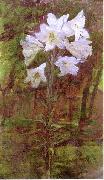
Oil On
Canvas, Real Flavor of Old Masters
|
Frieseke, Frederick Carl
|
|||
|
|
|||
| American Impressionist Painter, 1874-1939 was an American Impressionist painter. He was born in Owosso, Michigan and studied at the School of the Art Institute of Chicago and the Academie Julian in Paris. Frieseke and his family resided for fourteen years in Giverny, which was also home to Monet. He had a great influence on the Americans at the colony there | |||
|
|
|||
|
|
Lilies new3/Frieseke, Frederick Carl_5HufvJ.jpg Painting ID:: 19046 Visit European Gallery |
By 1911 Oil on Canvas Terra Foundation for the Arts, Chicago. | |
Height Width |
INS/CM |
||
|
X |
|
||
|
|
|||
|
Louis Lcart
|
|||
|
|
|||
| French (1880-1950) Louis Icart was born in Toulouse, France. He began drawing at an early age. He was particularly interested in fashion, and became famous for his sketches almost immediately. He worked for major design studios at a time when fashion was undergoing a radical change-from the fussiness of the late nineteenth century to the simple, clingy lines of the early twentieth century. He was first son of Jean and Elisabeth Icart and was officially named Louis Justin Laurent Icart. The use of his initials L.I. would be sufficient in this household. Therefore, from the moment of his birth he was dubbed 'Helli'. The Icart family lived modestly in a small brick home on rue Traversi??re-de-la-balance, in the culturally rich Southern French city of Toulouse, which was the home of many prominent writers and artists, the most famous being Henri de Toulouse-Lautrec. Icart fought in World War I. He relied on his art to stem his anguish, sketching on every available surface. It was not until his move to Paris in 1907 that Icart would concentrate on painting, drawing and the production of countless beautiful etchings, which have served (more than the other mediums) to indelibly preserve his name in twentieth century art history. When he returned from the front he made prints from those drawings. The prints, most of which were aquatints and drypoints, showed great skill. Because they were much in demand, Icart frequently made two editions (one European, the other American) to satisfy his public. These prints are considered rare today, and when they are in mint condition they fetch high prices at auction. Art Deco, a term coined at the 1925 Paris Exposition des Arts Decoratifs, had taken its grip on the Paris of the 1920s. By the late 1920s Icart, working for both publications and major fashion and design studios, had become very successful, both artistically and financially. His etchings reached their height of brilliance in this era of Art Deco, and Icart had become the symbol of the epoch. Yet, although Icart has created for us a picture of Paris and New York life in the 1920s and 1930s, he worked in his own style, derived principally from the study of eighteenth-century French masters such as Jean Antoine Watteau, François Boucher and Jean Honor?? Fragonard. In Icart's drawings, one sees the Impressionists Degas and Monet and, in his rare watercolors, the Symbolists Odilon Redon and Gustave Moreau. In fact, Icart lived outside the fashionable artistic movements of the time and was not completely sympathetic to contemporary art. Nonetheless, his Parisian scenes are a documentation of the life he saw around him and they are nearly as popular today as when they were first produced. In 1914 Icart had met a magical, effervescent eighteen-year-old blonde named Fanny Volmers, at the time an employee of the fashion house Paquin. She would eventually become his wife and a source of artistic inspiration for the rest of his life. | |||
|
|
|||
| This artist (Louis Lcart) is not available now. | |||
|
|
|||
|
Ellen Day Hale
|
|||
|
|
|||
| 1855-1940 was an American painter and printmaker. She was born in Worcester, Massachusetts, her family was involved in the arts, her father Edward Everett Hale was an author, her great-aunt Harriet Beecher Stowe wrote Uncle Tom's Cabin. She studied art under Boston painter William Morris Hunt and helped raise her 7 brothers and sisters. Later she studied in at the Academie Julien in Paris. | |||
|
|
|||
|
|
Lilies new24/Ellen Day Hale-679785.jpg Painting ID:: 82286 Visit European Gallery |
Date circa 1890 cyf | |
Height Width |
INS/CM |
||
|
X |
|
||
|
|
|||








